Sex harassment claims, accreditation warnings. Coroner staff still got raises and bonuses
The Clark County coroner’s office received nationwide accolades for its compassionate handling of the country’s deadliest mass shooting.
But behind the walls of its bunker-like office west of downtown, workers accused colleagues of sexual harassment and retaliation, delays in autopsies threatened the agency’s accreditation, the coroner was often absent and county oversight was largely missing, a Review-Journal investigation found.
Top county managers, who are responsible for essential offices like the coroner, say they only recently learned of some problems, which occurred during a span of five years.
Now, three county commissioners said there should be further inquiry into former Coroner John Fudenberg’s leadership and what county managers did to address the problems.
“The allegations are alarming,” said Commissioner Ross Miller,who assumed the office in January. “If any of that’s true, it absolutely merits a further investigation.” His comments were echoed by Vice Chairman Jim Gibson and Commissioner Tick Segerblom, who was an attorney specializing in employee-employer relations.
County Manager Yolanda King praised then-Coroner John Fudenberg’s response to the Oct. 1 shootings but said there were problems at the agency he ran.
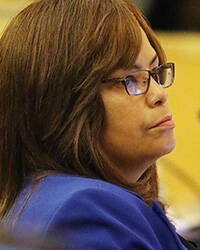
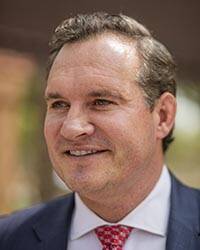

We “became increasingly aware of issues within that office that needed to be addressed, including some serious personnel matters that were investigated by the County,” she said in an emailed statement. The coroner’s office “is in a very different place today than it was a few years ago.”
Despite the problems, county officials gave Fudenberg his largest percentage raise in 2018 plus bonuses totaling more than $11,500 that were paid in 2017 and 2018, records show.
Fudenberg responded through a text message, saying he did not want to be contacted unless the Review-Journal sent him written questions. The newspaper sent him concerns uncovered by the investigation, but he did not respond to the email or subsequent calls.
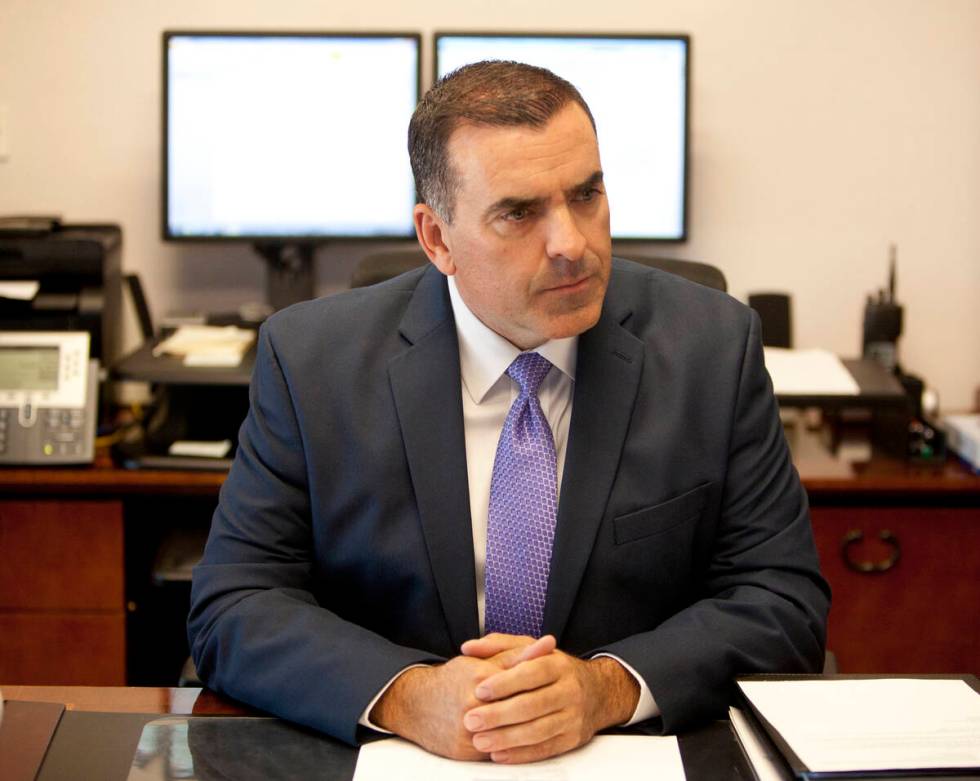
Management concerns
The Clark County Office of the Coroner/Medical Examiner is integral to solving homicides, prosecuting murders and helping families cope with the violent deaths of loved ones.
[ Coroner vs. medical examiner: What system is best for Clark County? ]
After Fudenberg took over as coroner in 2015, more than a dozen employees — or about a quarter of the full-time staff — left in the next two years, records show. Most of the former employees did not respond to calls to determine why they left. But several who did tell a story of an often-absent coroner, an unprofessional work atmosphere and nonexistent oversight from top county staff.
Forensic supervisor Bill Gazza spent 23 years at the coroner’s office, retiring right after the Oct. 1, 2017, massacre because he was concerned about Fudenberg’s management.
“It’s a unique job, and it takes a unique individual to lead that group,” Gazza said. “John was just not a manager. That’s an acquired skill.”
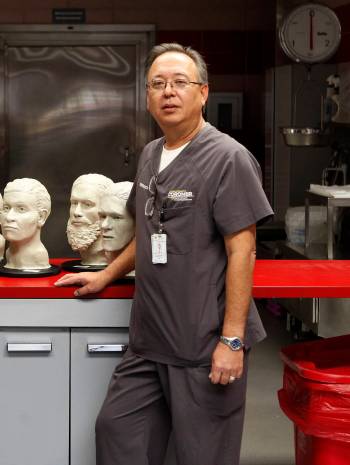
Gazza said Fudenberg often put off key decisions. “If something needed to be done, John would wait until the last minute to task it,” Gazza said, adding that he liked working with the rest of the staff, whom he respected.
Fudenberg was out of the office nearly a fifth of his time, on average, between 2017 and his retirement last year, according to a Review-Journal analysis of Fudenberg’s calendars, vacation and key card logs and work travel documents. He was on vacation, giving speeches, working on International Association of Coroners & Medical Examiners business, at conferences, or dealing with personal matters. He also spent months every other year in Carson City lobbying the Legislature for the county.
[ Fudenberg touted two degrees from a discredited diploma mill ]
Paul Parker, who was assistant coroner under Fudenberg for the first year and a half, defended Fudenberg’s leadership, saying most of the people who left reached retirement or were terminated.
“I thought quite frankly that with the exception of a few of (former Coroner Michael) Murphy’s allies, morale was pretty good, especially for what we did every day,” said Parker, who said he left in 2017 to move back to San Diego, where his family was living. “People were given the opportunity to talk and we listened to them.”
Accreditation problems
With fewer experienced employees, the work of determining causes of death took longer. Clark County handled between 3,700 and 5,000 cases a year between 2014 and 2020.
The percentage of autopsies with pending reports after 60 and 90 days increased significantly in 2017, county statistics show. The following year, delays increased. In 2018, 230 were pending after 90 days. In 2016, the number was 96.
The National Association of Medical Examiners (NAME) placed Clark County on provisional accreditation in August 2019 — which has not been previously reported — because of the pending autopsy reports.
NAME President Dr. James Gill said completing autopsies quickly is a key function for coroners and medical examiners. “It may delay grand jury indictments,” he wrote in an email exchange. “It may result in prosecutors using preliminary autopsy information that may cause problems later.”
Clark County Assistant District Attorney Christopher Lalli declined to comment about whether coroner delays impacted any criminal cases.
The coroner’s office regained its full accreditation in March 2020 after staff addressed the delays. It appears the Oct. 1, 2017, mass shooting did not cause the delays because pending cases in 2017 were highest in the two months before the shooting, a Review-Journal analysis of coroner data shows.
Gill said provisional accreditation is fairly uncommon. Just six of the 98 offices NAME accredits are under provisional status.
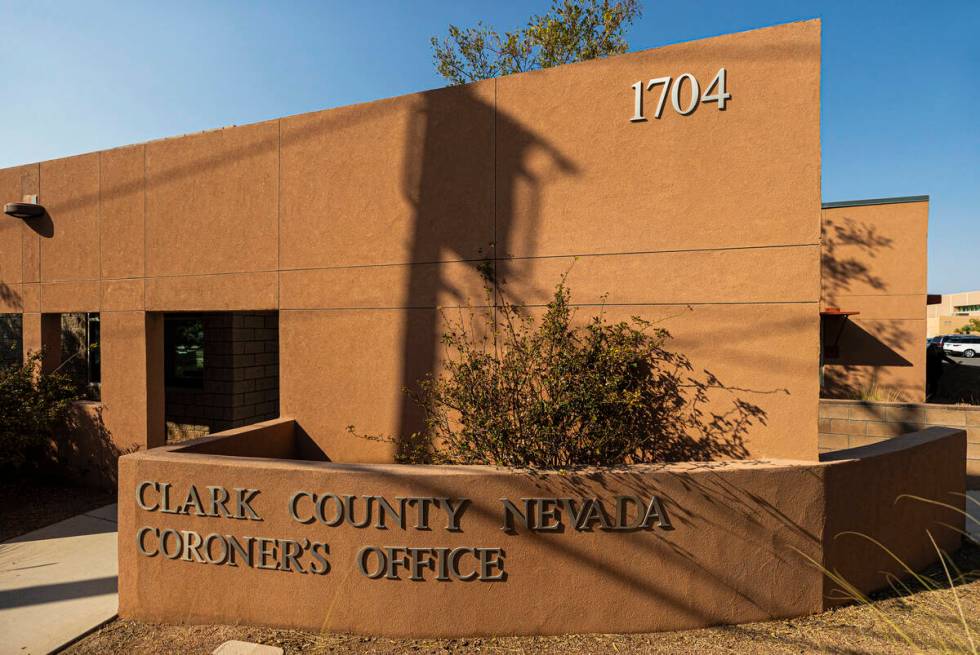
Hiring more pathologists
Assistant County Manager Jeff Wells said that he initially did not know about the accreditation issue and couldn’t remember when he found out. But once he did, the county took quick action. “There is a national shortage of forensic pathologists,” he said. “We are fixing the problem here.”
Within the past year, Wells said he added two full-time pathologists and increased the compensation and the number of contract pathologists. He said county offices with 24/7 schedules, like the coroner, normally experience higher turnover.
Between 2017 and 2019, county officials gave Fudenberg salary increases and bonuses worth a total of nearly $35,000, records show.
In 2019, the year the county was placed on provisional accreditation, Fudenberg listed one of his performance goals as maintaining “both of our NAME and IAC&ME medicolegal accreditations,” a performance report obtained by the Review-Journal shows.
Unlike prior years, when Fudenberg received merit pay raises of 4 percent or more, he received only a 2 percent increase in 2019, but the county gave him a $4,000 bonus that year for his work in Carson City. Others who lobbied received similar payments, county officials said.
The increase, which was less than raises awarded to other staff, was “certainly reflective of our concerns with the office,” county spokesman Dan Kulin wrote in an email.
Wells also said he wasn’t aware of two speeches Fudenberg gave in August 2018 until the Review-Journal provided documentation showing Fudenberg accepted $7,500 in honorarium without taking vacation time. Fudenberg also signed up as an expert witness for Los Angeles County to defend a lawsuit and was paid to work for the IAC&ME, records show. The association hired him as executive director after he retired in 2020.
Sexual harassment, retaliation claims
For some coroner staff, the work atmosphere was becoming unbearable, according to half a dozen staff members. They say they endured favoritism, sexual misconduct and retaliation. Several would speak only on the condition of anonymity.
Caitlyn Ammann, a forensic pathology tech who was hired full-time in 2016, complained to the county in 2018 that a male co-worker repeatedly sexually harassed her. Ammann provided what she said is a county discrimination charge document. In it, she claimed that the co-worker would refer to her breasts as a “boob shelf,” commented on her “curves” and was “yelling and belittling her based on her gender.”
Amman charge of discrimination to Clark County Office of Diversity by Las Vegas Review-Journal on Scribd
Other staff members, who talked on the condition of anonymity, confirmed Ammann’s account, and she provided internal emails and records to the Review-Journal backing up her statement that she filed a harassment complaint in 2018.
Wells said that once the county became aware of harassment allegations, the Office of Diversity conducted several investigations that led to discipline, including terminations, for some employees.
“I’m in total agreement that there was unacceptable behavior in that office,” Wells said in an interview this month.
After Ammann filed her complaint, she emailed that Amanda Senger, another forensic tech who was friends with the co-worker Ammann complained about, knew about her complaint and was treating her differently. “It’s interesting that after a year and a half of his sexual comments, yelling at me, and putting me in my place, he has all of a sudden stopped,” she wrote an OOD staffer on June 12, 2018. “All I can say is both Amanda and (the co-worker) know about the investigation and in their own way have let me know that they know.”
Ammann said a counter complaint was filed against her alleging that she had exposed her breasts. She doesn’t know who filed the complaint, and the county wouldn’t identify the complainant.
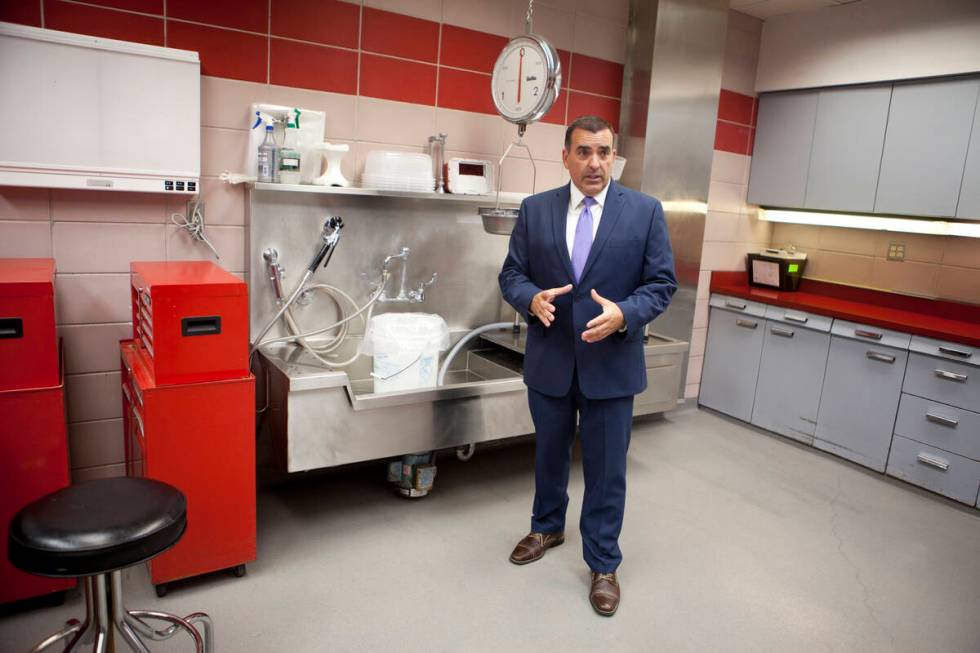
Photo in forensic office
In fact, it was Senger who exposed her breasts in the office.
A cellphone photo of Senger, obtained by the Review-Journal, shows her facing the phone, grinning broadly with her office scrubs pulled up to her armpits, exposing her breasts to the person taking the photograph, said to be a male co-worker in the county’s forensics office. The person who took the photo was a different male co-worker than the one cited in Ammann’s OOD complaint, sources said.
It is not clear how many people knew about the photo or how widely it was distributed. County officials were not aware of the photo until the Review-Journal asked about it, Kulin wrote in an email.
Ammann sent an email to the diversity office about the retaliation, but she said then-Assistant Coroner Brett Harding would not forward a formal complaint to OOD.
Harding, who currently works for Idaho’s Ada County coroner’s office, did not return calls or an email seeking comment.
The county refused to release Ammann’s disciplinary and performance review records, but she provided the records to the Review-Journal.
The county also declined to provide annual reviews and disciplinary documents for other staff, like Fudenberg, Harding, Senger or the co-worker Ammann says she complained about, citing personnel confidentiality.
The allegation that Ammann exposed herself was dismissed, according to Ammann and records she provided. She admitted to showing the male co-worker she complained about a corset she wore for back support while lifting heavy loads, and to letting him feel her “glute.” She said those complaints were sustained.
Ammann and other former staffers said OOD put her, and the co-worker she claims harassed her, on two-year, last-chance probation, but Fudenberg reduced the male co-worker’s probation.
Wells said the county recently removed the ability of department heads to change discipline decisions, and now a committee of senior managers decides discipline based on OOD recommendations.
Despite Ammann’s complaints, the co-worker and Senger received 4 percent merit pay increases every year, records show. Ammann received only her 2 percent cost of living increase in 2019 after a negative performance review, which says she failed to meet expectations with her “interpersonal skills.” It also notes the “disciplinary action equivalent to a Final Written Warning.” In her 2017 and 2018 performance reports, she received good reviews and she received 4 percent merit and 4 percent promotion increases in 2018, records show.
Ammann was fired in 2020 after another employee alleged Ammann kissed her on the cheek and whispered that it wasn’t sexual harassment if she liked it. Ammann admits to an innocent kiss but said she never made the comment.
The county promoted Senger to senior forensic pathology tech in October 2020, records show.
“The county allowed this to happen,” Ammann said. “Fudenberg allowed this to happen. And we lost good people.”
Senger said she did not retaliate against Ammann and was not disciplined.
After the Review-Journal asked Senger about the photo of her exposed breasts, she said her personal safety and her job were threatened if she didn’t expose herself. She declined to say who threatened her, reveal who took the photo, or name witnesses she said heard the threats. She conceded she did not report the threats to top county officials, OOD or law enforcement.
“I’m still terrified of him ruining my life and my career,” she said, calling the photo “revenge porn” but conceding she never had a personal relationship with the male co-worker who shot the photo.
Harassment claim at party
Despite women making up more than 80 percent of the coroner’s staff, Senger said there was a “boys club” atmosphere at the office. But she said she had no problems with Fudenberg’s leadership.
Three former employees also claimed then-Assistant Coroner Harding was the focus of a sexual harassment allegation during the agency’s 2018 holiday party but was not disciplined.
Coroner Investigative Forensic Supervisor Timothy Gocha, reached at his new job in Texas, said “it’s not untrue” when asked whether he reported harassment against Harding. He declined to comment further. The alleged victim of the holiday party incident did not return calls.
In response to the allegations of inappropriate conduct, Wells said he discouraged coroner’s office staff from having off-site gatherings that involved alcohol.
Melanie Rouse, who was appointed Clark County’s new coroner in June, said she requires her employees to come to her with any problems. “The cultural shift started before I arrived,” said Rouse, who previously headed investigations and operations in the Maricopa County, Arizona, Medical Examiner’s office. “I just want to maintain a professional atmosphere and instill in employees not just that they should report (harassment) but they’re required to report it.”
King said the county has recently made “substantial and meaningful changes to operations and staffing, and continue(s) working to improve the performance of the office.”
Clark County Commission Chairwoman Marilyn Kirkpatrick and Commissioners Justin Jones, William McCurdy II and Michael Naft did not respond to requests for comment about the county’s handling of issues in the coroner’s office.
With nearly 2.3 million residents, Clark County is one of the most populous jurisdictions with a coroner overseeing death investigations instead of a medical examiner.
Medical examiners’ offices are run by a licensed physician while coroners are usually appointed or elected officials with little or no medical training. Clark County coroner staff are responsible for determining the cause of suspicious and violent deaths, investigating suicides and helping police identify victims through fingerprints and dental X-rays.
Washoe County operates with a medical examiner system, as do counties that include the large metropolitan areas of Denver, Seattle, San Diego, San Francisco, Portland, Oregon, and Phoenix. Los Angeles County has a medical examiner-coroner. Orleans Parish in Louisiana has a coroner who serves fewer than 400,000 people.
Dr. Marcella Fierro, who served as a chief medical examiner in Virginia and co-authored a key study for the National Research Council in 2009 that recommended all coroners’ offices convert to medical examiners, said Clark County should change its death investigation system.
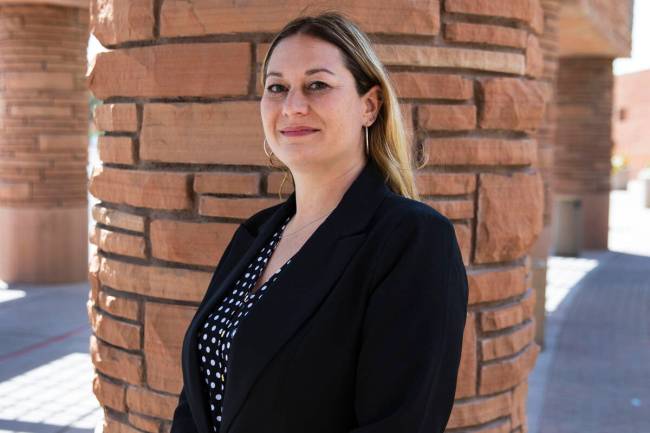
“It would be good for Clark County to have a medical examiner-run office,” she said. “They have an interesting mix of cases and people from all over the world and need a high level of competency.”
But Clark County Assistant Manager Jeff Wells said there are so few certified forensic pathologists available that having one take up his or her time as a manager instead of completing autopsies would be a waste of the doctor’s medical skills.
Charleston County, South Carolina, Coroner Bobbi Jo O’Neal, who is president of the International Association of Coroners and Medical Examiners, said the quality of autopsies and investigations depends on the person running the office and the training provided to staff.
“There are some poor coroners’ offices around and very good and very poor medical examiners,” she said, adding that being an elected coroner gives her independence from outside influence.
Clark County Coroner Melanie Rouse, who was appointed in June, leads an office of 41 full-time staff, including an assistant coroner, 15 investigators and supervisors, a dozen forensic techs and assistants, five medical examiners and support staff. The office is funded for 53 full-time staff and about 30 part-time employees.
Rouse said small coroner’s offices that don’t have medically trained staff determining the cause and manner of death are the biggest concern.
“One of the important things is having medical examiners doing medical investigations,” said Rouse, who previously worked for 16 years at the Maricopa County medical examiner’s office, rising to chief death investigator and operations manager. “We do have that here.”
Former Clark County Coroner John Fudenberg claimed university degrees from a discredited diploma mill, and he made thousands of dollars, on taxpayer time, for outside speeches related to the Oct. 1 shooting, according to new records and interviews.
Former Clark County Commissioner Chris Giunchigliani, who as a state assemblywoman sponsored legislation that makes it a misdemeanor to knowingly represent having a degree that wasn’t properly earned, said she was “surprised and disappointed” that Fudenberg claimed the degrees — and that he may have violated her 2005 law.

“I think it could fit,” she said after reviewing his resume and a 2015 New York Times story about the diploma mill. “The AG should look into it.”
Fudenberg, who retired in 2020 and is currently executive director of the International Association of Coroners & Medical Examiners, did not respond to repeated requests for comment, including an email from the Review-Journal detailing diploma and speech concerns.
His tenure leading the coroner’s office raises questions about the county’s oversight of its department heads.
In July, the Review-Journal revealed Fudenberg’s retirement package, sparking questions about whether he cashed out nearly $20,000 in unused vacation pay, despite his work calendar showing hundreds of vacation hours not recorded in the county’s payroll system. As coroner, he also hired his girlfriend’s meditation company to do work at the county’s expense, raising potential conflict of interest concerns.
[ Sexual harassment, retaliation claims, autopsy delays, little oversight plagued the office ]
Giunchigliani questioned how well county human resources staff vet job candidates. Clark County Assistant Manager Jeff Wells, who oversees the coroner’s office, said the county recently beefed up background checks, requiring fingerprinting for all jobs. Wells also said he wasn’t aware of two speeches Fudenberg gave in August 2018 until the Review-Journal provided documentation showing Fudenberg accepted $7,500 in honorarium without taking vacation time.
“Any manager has to rely on the judgment/ethics of your department head,” he said. “You can only take action on things you know about.”
Fudenberg, who was coroner for five years, made nearly $230,000 in salary and benefits his last full year and receives a pension of about $120,000 a year.
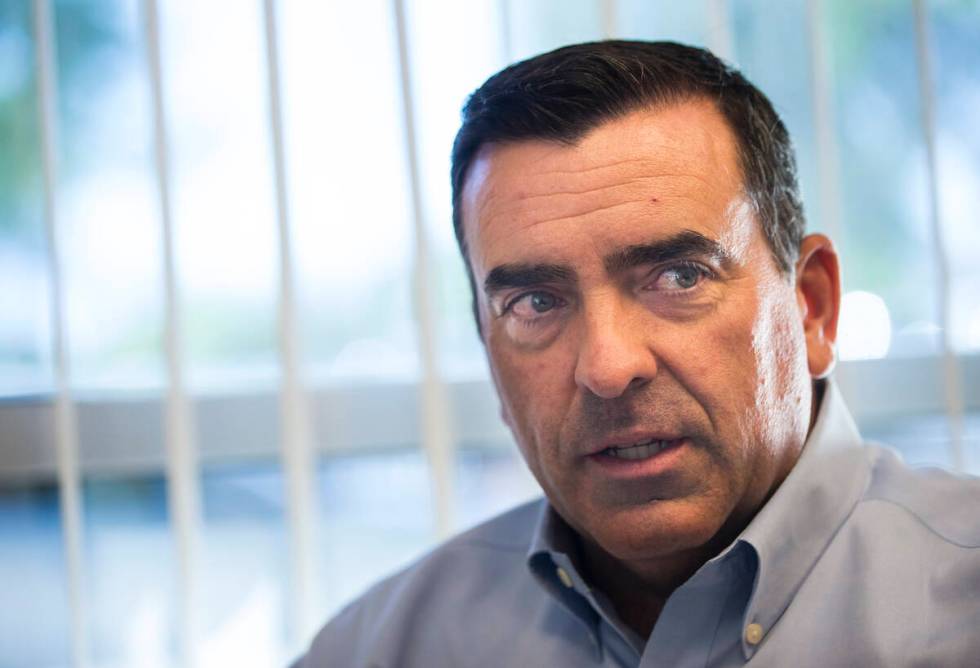
Unearned degrees
The Oct. 1, 2017, mass shooting gave Fudenberg a much higher public profile. Speaking requests followed.
He had started his career as a work-release officer in Minnesota and rose to sergeant in the Las Vegas city marshal’s office. In 2003, the county hired him as assistant coroner and appointed him to the top job in 2015.
Since at least 2017, Fudenberg repeatedly touted having two college degrees: a bachelor’s degree in Business/Human Relations and an MBA — both from Barkley University in San Francisco.
A 2017 resume lists the degrees, and he was identified during a 2020 speech at the American Academy of Forensic Sciences as having an MBA. He also listed the MBA on a 2019 academic paper he co-authored with a group of doctors on mass shooting injuries.
Barkley University was linked in 2015 by The New York Times to a Pakistani diploma mill, and the school now has a defunct website. Barkley was even mocked by late-night TV host Stephen Colbert. The founder of the company that ran Barkley and other websites was sentenced in 2018 to seven years in prison on charges stemming from the diploma mill.
Fudenberg’s 2017 resume also stated he attended Normandale Community College and the University of Minnesota. The schools confirmed he took classes but did not earn degrees.
AAFS Assistant Director Kimberly Wrasse declined to comment about Fudenberg but forwarded the information about his Barkley degrees to AAFS leadership.
Matthew R. Carmichael, managing editor of the Journal of the American College of Surgeons, which published the paper Fudenberg co-wrote, said the journal is issuing a correction in the December issue after learning of the Barkley degree from the Review-Journal. The correction “indicates Mr. Fudenberg was credited for an MBA degree that he did not earn.”
In an email, Carmichael wrote that Fudenberg told him he has an MBA that is not from an accredited university.
Dr. Babak Sarani, who co-authored the paper with Fudenberg, conceded that claiming unearned degrees is a “huge no-no” but said the findings are solid because the conclusions were reached by a group of researchers. “I’m clearly disappointed, but it doesn’t impact the results,” he said.
Before 2020, the Clark County coroner’s job required either a physician’s license or experience in law enforcement. A college degree was not required for candidates with police experience.
“Mr. Fudenberg did not claim to have any college degrees in applications to the County, and we were not aware of him making such claims with anyone else,” county spokesman Dan Kulin wrote in an email.
Wells said qualifications for coroner were reviewed only after the county started looking for a new coroner last year, and officials decided to require at minimum a bachelor’s degree.
Ross Zumwalt, a former chief medical investigator in Albuquerque who co-authored a key study on how to improve forensics, said coroners should have graduated from college. “I think anybody who is a coroner needs to have a decent, basic education and some knowledge of science and understanding of medical terms,” he said. “Otherwise they could get pressured into making some decisions they don’t understand.”
Insensitive comments
Fudenberg also made insensitive comments during his 2020 AAFS speech about using mass shootings to generate funding, a video shows. He was not paid for that speech.
“Right now the legislatures are … very aware of these mass shootings going on,” he said. “So now’s the time to jump on them and take advantage, of play that sympathy card, go up there and create some tears if you have to … do whatever you got to do to take advantage of them (and) get some money dedicated to our community.”
Fudenberg had successfully lobbied the Nevada Legislature for a 2019 bill that raised death certificate fees that go to coroners from $1 to $4 per certificate. The money was supposed to fund mental health programs for staff and frontline workers responding to mass casualty incidents.
Former state Sen. Ben Kieckhefer, who was on the Governmental Affairs Committee when it sponsored Senate Bill 463, expressed concern after the Review-Journal read him the comments. “I was skeptical of the (fee) increase and looks like I was rightfully skeptical,” he said.
Records show Clark County raised about $350,000 from the fee increase that has not been spent. Wells and new Clark County Coroner Melanie Rouse said they are finalizing how to use the money and “it won’t be for meditation.”
Lucrative outside work
Fudenberg also collected thousands of dollars in speaking fees while on taxpayer time, records show.
County policy requires employees to get their supervisors’ written authorization for outside work, and Fudenberg’s 2020 authorization includes a note that says he takes vacation time for all paid speeches.
But public records show Fudenberg collected $7,500 for two events in August 2018, including a three-hour training session for Snohomish County in Everett, Washington, and a speech at the Iowa Trauma Conference run by the Department of Public Health. Clark County payroll records show he logged no vacation time for August of that year despite his calendar listing Aug. 13 and 14 and Aug. 23 to Aug. 30 as vacation days in 2018.
It’s not clear how much Fudenberg collected for speeches while he was coroner because he failed to file required state ethics disclosures that would have revealed that information.
Clark County Commissioner Tick Segerblom said Fudenberg’s paid speeches on county time and failure to file disclosures “violated the ethics for sure.”
Ethics Commission Counsel Tracy L. Chase declined to comment on whether the agency is looking into any issues involving Fudenberg, citing confidentiality provisions.
Expert witness
Along with speaking engagements, Fudenberg hired himself out as an expert witness in a controversial California lawsuit.
In March 2020, outside counsel representing Los Angeles County filed a document showing Fudenberg planned to charge as much as $750 an hour to act as an expert defense witness in a lawsuit brought by L.A. coroner investigator Denise Bertone. Bertone sued the county in 2017, claiming she was retaliated against after reporting that a doctor injected a disabled boy, who nearly drowned, with 500 micrograms of fentanyl to hasten his death, the lawsuit alleges. A nonprofit that works with the coroner’s office wanted to harvest the boy’s organs, the lawsuit alleges.
Los Angeles County refused to provide documents showing what Fudenberg was paid, saying the records are about pending litigation and protected under attorney-client privilege. Attorneys for Bertone declined comment, and the outside attorney representing Los Angeles County, Avi Burkwitz, did not return calls or emails.
In the resume filed with the expert witness designation, Fudenberg left off the Barkley University degrees, records show.
Clark County officials voiced concerns about a 2019 bill that quadrupled the portion of the death certificate fee that county coroners receive, new records and interviews show.
The bill helped the coroner’s office raise an additional $350,000 earmarked for mental health programs, but the money has not been spent, according to county spokesman Dan Kulin.
Senate Bill 463 was successfully pushed by then-Clark County Coroner John Fudenberg, after the Oct. 1, 2017, mass shooting on the Strip. During his tenure as coroner, Fudenberg acted as the county’s lobbyist in Carson City.
The measure raised the fee coroners statewide receive for each death certificate request from $1 to $4.
The legislation earmarked the money, in part, to fund mental health programs for first responders after mass casualty events and bereavement programs for the public.
Fudenberg was contracting with a mental health coordinator before he retired in August. But the position, paying approximately $64,000, never happened, Kulin wrote in an email.
The coroner’s office has a general operating fund budget of about $7.5 million for 2022, the county confirmed, with an additional $1 million in other sources like grants, death certificate fees and contracts. The office employs 53 full-time staff members.
Controversial funds
On Feb. 13, 2020, Fudenberg wrote to his manager, Assistant County Manager Jeff Wells, that he wanted to keep Wells informed about plans for a mental health coordinator because of unspecified concerns by County Manager Yolanda King and County Chief Administrative Officer Les Lee Shell.
“I wouldn’t normally bother you with this but you’ve indicated Yolanda and Les Lee are not happy with the passing of SB 463 so I want to make sure you’re aware of our plan moving forward,” he wrote.
Wells said he could not remember King and Shell’s concerns, and Kulin declined comment.
“I don’t have a comment on your other inquiry,” he wrote after the Review-Journal inquired about the administrators’ concerns.
Fudenberg said that he does not remember any controversy and thought that the legislation passed unanimously. “Not only lawmakers but the county manager was very happy with the bill and very supportive,” he said in a phone interview.
The Southern Nevada Health District charges $38 for the first death certificate and $25 for each subsequent copy, and $4 from the fees goes to the Clark County coroner.
Lawmaker concerns
The bill passed 65-5 in the 2019 session, and Gov. Steve Sisolak signed it on June 14, 2019. But a bipartisan group of lawmakers voted against the legislation, saying it wasn’t necessary or well thought out.
“I had just gone through the death of my mother and realized getting copies of death certificates often costs several hundred bucks,” then-Assemblyman Al Kramer, R-Carson City, said in a phone interview. “It’s not like you’re taxing the rich here. You’re often talking about the poorest of the poor.”
Assembly Majority Floor Leader Teresa Benitez-Thompson, D-Reno, agreed.
“I didn’t see a strong plan to use those dollars, and that is not good policy,” she said, adding other agencies and nonprofits already provide bereavement programs.
Before retiring in 2020, Fudenberg touted the fee increase to Cook County, Ill., Chief Medical Examiner Ponni Arunkumar and suggested that his girlfriend, Catherine Scherwenka, could provide some meditation services, according to records the Review-Journal obtained.
“I’ve attached statue (sic) that allows us to raise money for our mental health program, lets discuss it and I’ll let you know how we got it passed,” he wrote on Aug. 8, 2019. “Here is my contact for Inner Peace Initiative (IPI) — Catherine Scherwenka — REDACTED, she’s expecting you (to) call.”
Cook County spokeswoman Natalia Derevyanny said the county did not contract with Scherwenka’s meditation company. Fudenberg had hired Scherwenka to provide meditation to Clark County employees and first responders, but he said they were not in a relationship at the time.
Former Clark County Coroner John Fudenberg cashed out nearly $20,000 in unused vacation pay upon retirement, but his work calendar shows he took hundreds of hours of vacation that weren’t recorded in the county’s payroll system.
The discrepancy raises the possibility that Fudenberg double-dipped, taking time off without reporting it to payroll, and then claiming the same hours as vacation payout owed to him when he left the office.
Fudenberg also failed to file required state ethics disclosures and hired his girlfriend’s meditation company to do work at the county’s expense, raising potential conflict of interest concerns.
Fudenberg’s tenure in the office and his nearly $175,000 retirement package, which included severance, early retirement and unused leave pay, raises questions about the county’s oversight of managers and whether they face accountability.
Assistant County Manager Jeff Wells said rank-and-file employees have to clock in to their jobs but conceded that managers, like Fudenberg, receive less scrutiny. “We don’t make department heads punch clocks,” he said. “I don’t micromanage.”
Clark County Commissioner Tick Segerblom said he is going to ask county administrators to look into the issues of the vacation payout and the payments to Fudenberg’s girlfriend uncovered by the Review-Journal.
“You’re raising issues that are legitimate, and I’m going to personally find out what happened,” he said. “Maybe we can claw some money back.”
Fudenberg said the retirement payments he received were appropriate, and his conduct in office was always ethical. “My payout was probably lower than most,” he said. “I mostly cashed out sick leave because I never had a long-term illness and didn’t have to use it. We’re lucky to have this system. It’s major benefit for us.”
Large cash payouts to government retirees have been controversial. The Review-Journal reported in 2018 that taxpayers owed almost $610 million to local government employees for unused paid time off.
The Review-Journal obtained Fudenberg’s calendars, key card entry data and vacation payroll records since 2016, analyzing when he had blocked off his calendar for personal time off, but didn’t log the vacation days into the county’s payroll system.
Wells, who supervised Fudenberg, said the former coroner was always on call, working so many hours that the county got its money’s worth.
“I actually think going back to One October (mass shooting) and going forward, I think he worked hundreds and hundreds of hours and did essential stuff,” Wells said. “I think he did a fine job for the county and the community.”
In his final full year as the coroner, Fudenberg made nearly $230,000 in pay and benefits. In the first six months of his retirement — the most recent data available — Fudenberg received nearly $62,000 in pension payments, records show. Fudenberg worked at the Las Vegas city marshal’s office until the county hired him in 2003 to work as assistant coroner. He was appointed to the office’s top job in 2015.
Retirement package
In July 2020, the county announced that Fudenberg was one of about 420 county employees taking voluntary retirement as part of the county’s effort to save money during the COVID crisis. But officials didn’t reveal the size of his exit package at the time.
The Review-Journal obtained records that showed the county paid Fudenberg a total of $174,967, including about $19,000 for unused vacation and bonus leave and $105,000 for accrued sick leave. He also received about $38,000 for severance and $12,000 for early retirement.
Based on the county’s early retirement policy of one week’s pay for every two years of service, Fudenberg should have received about eight weeks of pay for early retirement, which would have totaled about $32,000. Instead, the county decided to give him a 12-week severance and an additional three weeks for accepting early retirement, totaling about $50,000, county officials said.
That allowed Fudenberg to get 15 weeks of pay, which was the maximum allowed under the early retirement policy, county spokesman Dan Kulin wrote in an email exchange.
The county’s manager compensation plan provides one week of severance for each year of service up to 12 weeks, but it also notes the decision to pay is “at the sole discretion of the County Manager.”
Segerblom said he believes severance should be for employees who are laid off or fired — not ones voluntarily retiring. “We can’t unilaterally give everything especially if it’s discretionary,” he said.
Also, Fudenberg’s calendar shows he repeatedly blocked dates for vacation or other non-work events without logging the hours in the payroll system. Then, he cashed out nearly 240 hours of vacation and bonus leave at about $80 an hour. County workers each year can carry over 240 hours of vacation.
For example, Fudenberg’s calendar says “John in MN” between June 29 and July 7, 2017, but no vacation hours were logged. The county did not have key card records going back to June 2017.
Between Aug. 23 and Aug. 30, 2018, Fudenberg’s calendar shows him traveling to St. Paul, Minn., and Iowa, noting vacation and flight times. None of those hours was logged as vacation. Key card records show him entering the coroner’s office at 7:44 a.m. on the 23rd but not the other dates.
Fudenberg said he didn’t remember the specific trips. He offered to research the vacation and respond by email but never did. Kulin said the key card records may be incomplete.
Fudenberg said he might have blocked vacation on his calendar but then decided not to take the time off, so there was no need to log vacation. “I religiously put in my vacation time,” he said, adding that he also received comp time every other year for his work as the county’s lobbyist in Carson City.
Failure to file
Fudenberg also said he always took vacation time if he received payment for speeches, but his failure to file required state financial disclosures makes that impossible to confirm.
Five months after the Oct. 1, 2017, massacre on the Las Vegas Strip, Fudenberg submitted an outside work request, allowing him to be paid for speaking engagements. In 2020, he refiled that form with a handwritten note that said he would only accept payment for engagements if he took vacation.
Appointees are required to file state disclosures that reveal how much honorarium, travel paid by non-government organizations and gifts they receive.
Appointed officials like Fudenberg “are supposed to file with us, but he never has,” Jennifer Russell, spokeswoman for the Nevada secretary of state’s office, said in an email exchange. Russell said the forms are designed to reveal conflicts of interest, but the office could not penalize Fudenberg because he is no longer a government employee.
Fudenberg filed Clark County disclosures, but those do not require him to reveal the same information as the state forms. They also do not relieve him of the requirement to file state forms, Russell said.
Fudenberg said he never took pay for a speech if he was on county time. “I was always extremely careful about conflicts of interest,” he said. He did not respond to requests to provide dates and amounts for paid speeches to determine whether he logged vacation.
Fudenberg also failed to file an outside work authorization in 2018, when he was paid $7,772 to act as secretary of the International Association of Coroners & Medical Examiners, the nonprofit’s tax returns show. After retiring in August, Fudenberg became executive director of the association.
Booking with girlfriend’s company
After the 2017 mass shooting, Fudenberg appeared in Review-Journal stories and other media touting the benefits of meditation and yoga to relieve stress for county employees.
On Oct. 18, 2017, the coroner’s office started to book meditation sessions, including services from a company called Inner Peace Initiative, which lists Catherine Scherwenka as a manager, incorporation records show.
Between October 2017 and May 2019, the coroner’s office paid more than $6,000 to Inner Peace Initiative or people listed on the company’s incorporation papers, records show. The sessions were for coroner staff, first responders and even families of Oct. 1 victims, Wells said.
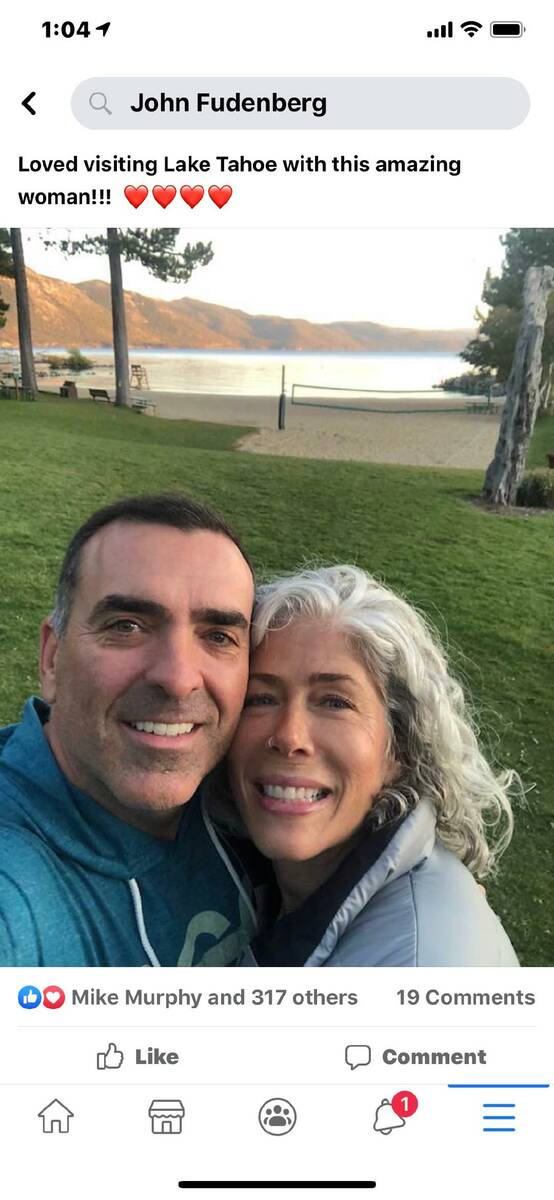
Scherwenka and Fudenberg’s social media accounts make repeated mentions of their personal relationship. The accounts show pictures of them attending sporting events and traveling, including an October 2019 trip to Lake Tahoe. During the trip, Fudenberg posted a picture of the two, cheek to cheek, with the text: “Loved Visiting Lake Tahoe with this Amazing Woman” and four heart emojis.
After the Review-Journal started asking questions, Segerblom said county managers assured him that Fudenberg was not in a relationship with Scherwenka when she received the county payments. But Segerblom said it would be a problem if they were dating at the time. “If there’s something with his girlfriend, that’s not good,” he said.
Fudenberg declined to say when he started dating Scherwenka, calling it “personal,” but said it was only after she completed her work for his office. Scherwenka could not be reached for comment.
But emails obtained through the state’s public records law indicate the relationship may have been going on as the county was paying Inner Peace.
On April 27, 2019, Scherwenka sent Fudenberg an invite to his work email, which he accepted, for a July weekend of camping at McWilliams Campground. A month later, in May 2019, the coroner’s office paid Inner Peace $375 in taxpayers’ money. The following month, Inner Peace billed the county an additional $700, but that payment came from the county’s social services department, records show.
Fudenberg blocked off Friday, July 26 to Monday July 29, 2019, on his calendar for the camping trip, but he failed to claim any vacation time, according to county payroll records.
Wells said Fudenberg notified county officials about his relationship with Scherwenka, but he could not recall when.
In the years leading up to his retirement, Fudenberg led the fight against a Review-Journal public records request for juvenile autopsy reports as part of an investigation into Child Protective Services. Courts, including the state’s top court, repeatedly ruled against the county, determining the records were public documents. After giving up the fight late last year, county taxpayers had to pay about $250,000 in legal fees and reimburse the newspaper for its legal costs.
Contact Arthur Kane at akane@reviewjournal.com and follow @ArthurMKane on Twitter and Jeff German at jgerman@reviewjournal.com and follow @JGermanRJ. Kane and German are members of the Review-Journal’s investigative team, focusing on reporting that holds leaders and agencies accountable and exposes wrongdoing.













